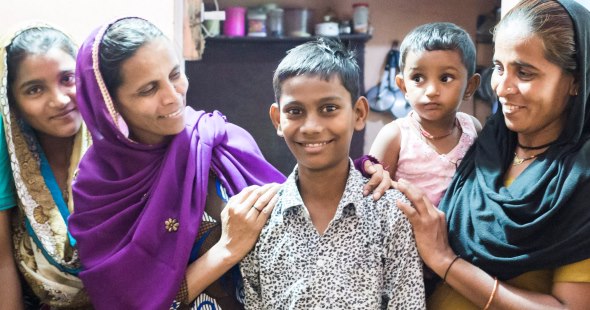Diagnosing TB in children

Overview
Accurate diagnosis of tuberculosis (TB) in children is a major challenge. Most commonly available TB tests are done on sputum, which many children cannot produce; and childhood TB often manifests with too few bacteria, so tests need to be extremely sensitive to detect them. FIND, in consultation with the National TB Program (NTP) of India, implemented a unique paediatric initiative in ten major cities in India to improve access to quality diagnosis. By focusing on children, the initiative prioritized a population that has traditionally been neglected in national TB programmes. It also paved the way for an important public-private collaboration, aiming to establish better standards of care for children with TB. This four-year-long paediatric initiative aimed to demonstrate the feasibility and efficacy of implementing the upfront molecular test GeneXpert, which provides results in less than two hours and can identify TB that is resistant to the first-line drug rifampicin.
The steps that were taken to establish this pilot project in India between 2014-2018, the TB findings, progress made and lessons learned are summarized in detail in the full report.
Initiating a paediatric TB project
To launch such a project, sites must be selected on it is necessary to inform national TB control programme (NTP) officials of the technical background of the project, its aims and objectives, and how to set it up within the health system. These officials can assist to identify which locations can serve as intervention sites and decide where to place GeneXpert equipment. Thorough assessments must be carried out to identify the logistics requirements for site preparation, power and equipment supply, biomedical waste management, sample transportation, training on GeneXpert, and much more. The necessary preparatory steps and other critical elements are described in detail in the India report under Planning and organization and Implementation.
Sustainability and replicability
Global health initiatives must be supported by the political will to be sustainably implemented in countries, and the support of the government is critical to the success of such a project. Data from the project in India has contributed to the development of a national policy on the use of GeneXpert for the diagnosis of TB in children. Moreover, India is now rolling out a national programme aimed at rapidly spotting cases of TB and drug resistance when a child presents with symptoms. Today processes in place in the country are similar to those instigated for this initiative: when a child presents is suspected of having TB, a sample is transported to a government facility with specialized laboratories dedicated to paediatric TB. Staff members inform the health provider of the test results via text message or email within 24 hours, permitting the doctor to immediately start the child on treatment. This greatly reduces the delay in diagnosis and the risk of transmission and mortality. The paediatric project in India has demonstrated the success of a very straightforward operational service delivery model, which can certainly be leveraged in other countries with a high disease burden. The project has also shown the value of bringing public and private healthcare providers together – and in so doing has established a trusted network of local doctors working in both public and private facilities to aid and expedite diagnosis and treatment.
Conclusions
Introducing innovative technology and rethinking the TB diagnostic process in India has enabled three times as many children to be diagnosed with TB than in the past. Same-day delivery of test results in 90% of cases facilitated prompt linkage to care, limiting disease transmission within the family and community, and providing the best chance of a positive treatment outcome. Open communication channels and local partnerships ensured that challenges could be identified and overcome as quickly and simply as possible. While the project was implemented in relatively small geography of only 10 cities, it provided the evidence base the NTP needed to take the necessary steps in the nationwide identification and management of paediatric TB. Upfront testing with GeneXpert is now part of India’s national implementation policy, as well as an integral part of the revised diagnostic algorithm. The number of GeneXpert machines has increased from 639 to over a thousand deployed across India and all districts now have at least one GeneXpert platform. The project focused on access to diagnosis, which is too often the missing element in the healthcare cascade. As a result, the specific needs of paediatric TB are now firmly on the agenda in India: multiple innovative e-based adherence tools have since been rolled out by the NTP to ensure that affected children complete the treatment regimen prescribed and mandatory notification of TB cases is being enforced throughout the country. Importantly, the paediatric TB guidelines are also being revised, demonstrating that the project has had a tangible impact on improving the standards of paediatric TB care in India. On 7 December 2018, this project was awarded the prestigious Public Health Initiative prize at the India Health & Wellness Summit and Awards.
Quick links

